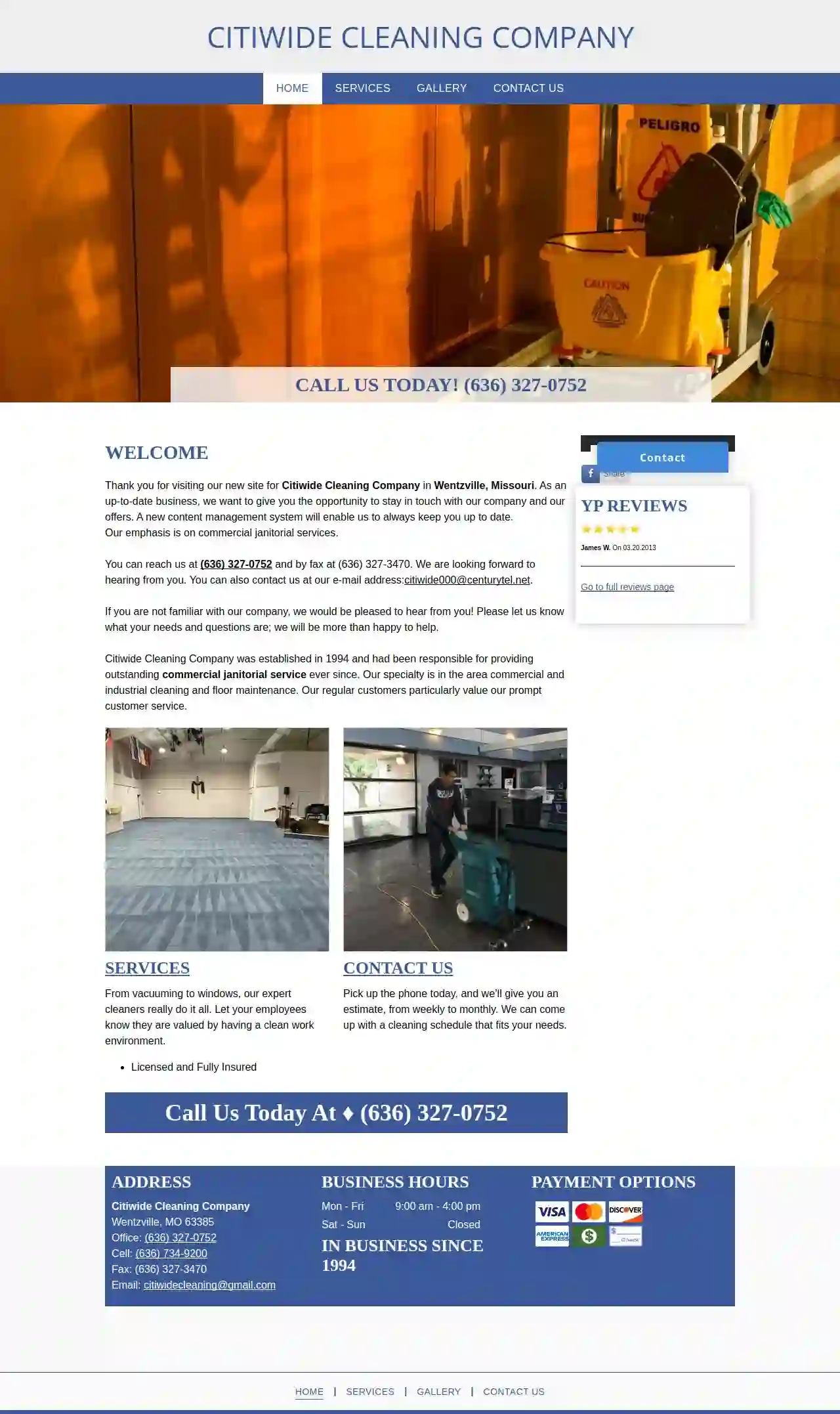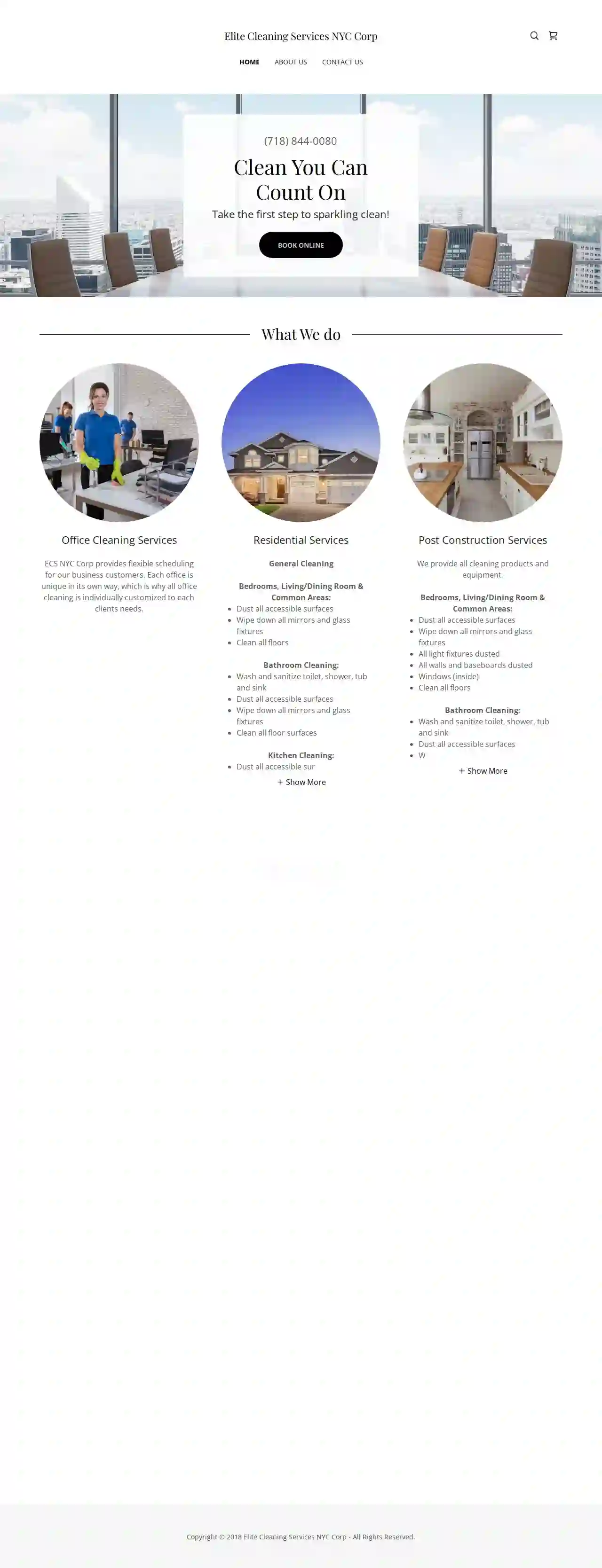Cleaning Services Frankfort
Best Apartment Cleaning in Frankfort
Receive 3 FREE Residential Cleaning quotes for your project today! Compare profiles, reviews, accreditations, portfolio, etc... and choose the best offer.

Gateway Cleaning Services
550 reviewsSuite 1, 9703 Gravois Rd, St. Louis, 63123, USGateway Cleaning Services offers premier cleaning services as part of the Titan Pest & Wildlife Solutions family, specializing in commercial and residential settings. We ensure that every space looks pristine and is conducive to a healthy, productive environment. Our mission is to provide peace of mind through superior cleaning services, enhanced by our integrated pest management and property maintenance approach, ensuring your spaces remain pristine and healthful. We prioritize our clients' needs, offering customized services tailored to their requirements. We use eco-friendly cleaning methods and products to ensure environmental safety and sustainability. We are reliable and consistent in our service delivery, ensuring our clients' peace of mind. We conduct our business with the utmost professionalism and ethical standards.
- Services
- Why Us?
- Accreditations
- Our Team
- Testimonials
- Gallery
Get Quote
Commercial Cleaning Experts
52 reviewsQueens, US- Services
- Why Us?
Get Quote
Lian Cleaning Services
525 reviewsSyracuse, US- Services
- Why Us?
- Gallery
Get Quote
A1 Janitorial Cleaning Service
516 reviewsQueens, US- Services
- Why Us?
- Gallery
Get Quote
ProClean Janitorial Services
57 reviewsBuffalo, US- Services
- Why Us?
Get Quote
Queen's A-1 Cleaning Services
52 reviewsQueens, US- Services
- Why Us?
- Gallery
Get Quote
Around the Clock Janitorial
44 reviewsHempstead, US- Services
- Why Us?
Get Quote
Citiwide Cleaning Company
51 reviewsQueens, US- Services
- Why Us?
Get Quote
Asap Commercial Cleaning LLC
57 reviewsBronx, US- Services
- Why Us?
Get Quote
Elite Cleaning Services NYC Corp
4.931 reviewsStaten Island, US- Services
- Why Us?
Get Quote
Over 60,241+ Janitorial Businesses on our platform
Our janitorial services operate in Frankfort & surroundings!
CleaningMatch has curated and vetted Top Janitorial Services in and around Frankfort. Find a trustworthy contractor today.
Frequently Asked Questions About Cleaning Services
- Clean Pet Bedding: Wash pet bedding regularly in hot water to remove odors and bacteria.
- Vacuum Thoroughly: Vacuum carpets, rugs, and upholstery frequently using a vacuum cleaner with a pet hair attachment.
- Enzyme Cleaners: Use enzyme cleaners specifically designed for pet odors. These cleaners break down the odor-causing molecules.
- Baking Soda: Sprinkle baking soda on carpets and upholstery, let it sit for a few hours, then vacuum. Baking soda absorbs odors.
- Air Fresheners: Use air fresheners or diffusers to mask odors temporarily.
- Professional Cleaning: For persistent odors, consider hiring a professional cleaning service specializing in pet odor removal.
- Type of cleaning: Deep cleaning, regular cleaning, move-in/move-out cleaning, and specialized cleaning (e.g., carpet cleaning) have different price points.
- Size of the property: Larger properties typically require more time and resources, resulting in higher costs.
- Frequency of cleaning: Regular cleaning schedules often have discounted rates compared to one-time services.
- Location: Cleaning costs can differ based on regional labor costs and demand.
- Additional services: Extra tasks, such as window cleaning, laundry, or organization, will add to the overall price.
- White Vinegar: A versatile cleaner that cuts through grease, removes stains, and deodorizes. Mix equal parts water and vinegar for a general-purpose cleaner.
- Baking Soda: A natural abrasive and deodorizer. Sprinkle baking soda on surfaces, let it sit, then scrub and rinse.
- Lemon Juice: Acts as a natural bleaching agent and disinfectant. Mix lemon juice with water for a cleaning solution or use it directly on stains.
- Castile Soap: A gentle and biodegradable soap made from plant oils. Mix a few drops of castile soap with water for a versatile cleaning solution.
- Essential Oils: Add a few drops of essential oils like tea tree oil or lavender oil to cleaning solutions for a natural fragrance and antibacterial properties.
- Online Directories: Use online directories like CleaningMatch to search for cleaning services in your area. Filter your search results by the specific cleaning type you need.
- Search Engines: Use search engines like Google to find cleaning services specializing in your desired cleaning type. For example, search for 'post-construction cleaning services near me' or 'eco-friendly cleaning services in [city name].'
- Ask for Referrals: Ask friends, family, neighbors, or colleagues if they know of any reputable cleaning services specializing in your desired cleaning type.
- Check Company Websites: Visit the websites of cleaning services in your area to see if they list the specific cleaning type you need among their services.
- Contact Companies Directly: Contact cleaning companies directly to inquire about their specialization in your desired cleaning type.
How do I get rid of pet odors in my home?
Regular cleaning, enzyme cleaners, and baking soda are effective methods for eliminating pet odors and maintaining a fresh-smelling home.
How much do cleaning services cost in the USA?
To get accurate pricing, request personalized quotes from reputable cleaning services on CleaningMatch. They will assess your specific needs and provide a tailored cost estimate.
What are some eco-friendly cleaning solutions?
Remember to test these solutions on a small, inconspicuous area first to ensure they don't damage delicate surfaces.
How do I find a cleaning service that specializes in [specific type of cleaning]?
By using these methods, you can find a qualified cleaning service that meets your specific cleaning needs.
How do I get rid of pet odors in my home?
- Clean Pet Bedding: Wash pet bedding regularly in hot water to remove odors and bacteria.
- Vacuum Thoroughly: Vacuum carpets, rugs, and upholstery frequently using a vacuum cleaner with a pet hair attachment.
- Enzyme Cleaners: Use enzyme cleaners specifically designed for pet odors. These cleaners break down the odor-causing molecules.
- Baking Soda: Sprinkle baking soda on carpets and upholstery, let it sit for a few hours, then vacuum. Baking soda absorbs odors.
- Air Fresheners: Use air fresheners or diffusers to mask odors temporarily.
- Professional Cleaning: For persistent odors, consider hiring a professional cleaning service specializing in pet odor removal.
Regular cleaning, enzyme cleaners, and baking soda are effective methods for eliminating pet odors and maintaining a fresh-smelling home.
How much do cleaning services cost in the USA?
- Type of cleaning: Deep cleaning, regular cleaning, move-in/move-out cleaning, and specialized cleaning (e.g., carpet cleaning) have different price points.
- Size of the property: Larger properties typically require more time and resources, resulting in higher costs.
- Frequency of cleaning: Regular cleaning schedules often have discounted rates compared to one-time services.
- Location: Cleaning costs can differ based on regional labor costs and demand.
- Additional services: Extra tasks, such as window cleaning, laundry, or organization, will add to the overall price.
To get accurate pricing, request personalized quotes from reputable cleaning services on CleaningMatch. They will assess your specific needs and provide a tailored cost estimate.
What are some eco-friendly cleaning solutions?
- White Vinegar: A versatile cleaner that cuts through grease, removes stains, and deodorizes. Mix equal parts water and vinegar for a general-purpose cleaner.
- Baking Soda: A natural abrasive and deodorizer. Sprinkle baking soda on surfaces, let it sit, then scrub and rinse.
- Lemon Juice: Acts as a natural bleaching agent and disinfectant. Mix lemon juice with water for a cleaning solution or use it directly on stains.
- Castile Soap: A gentle and biodegradable soap made from plant oils. Mix a few drops of castile soap with water for a versatile cleaning solution.
- Essential Oils: Add a few drops of essential oils like tea tree oil or lavender oil to cleaning solutions for a natural fragrance and antibacterial properties.
Remember to test these solutions on a small, inconspicuous area first to ensure they don't damage delicate surfaces.
How do I find a cleaning service that specializes in [specific type of cleaning]?
- Online Directories: Use online directories like CleaningMatch to search for cleaning services in your area. Filter your search results by the specific cleaning type you need.
- Search Engines: Use search engines like Google to find cleaning services specializing in your desired cleaning type. For example, search for 'post-construction cleaning services near me' or 'eco-friendly cleaning services in [city name].'
- Ask for Referrals: Ask friends, family, neighbors, or colleagues if they know of any reputable cleaning services specializing in your desired cleaning type.
- Check Company Websites: Visit the websites of cleaning services in your area to see if they list the specific cleaning type you need among their services.
- Contact Companies Directly: Contact cleaning companies directly to inquire about their specialization in your desired cleaning type.
By using these methods, you can find a qualified cleaning service that meets your specific cleaning needs.